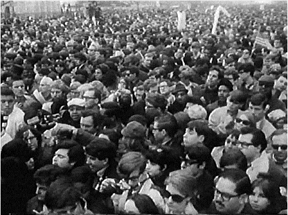Recently in meditation I had an image of myself as a bridge, a channel, a conduit through which energy flows from the past, swirls through the present where it picks up new vigor, and pours out into the future. Sometimes the energy gets stuck, and doesn’t swirl through the present but pools there before being released. I think that’s a good explanation for the lack of flow into this space in recent weeks. And being stuck thus is not necessarily a Bad Thing.
I was reminded tonight of a piece of my past. Someone’s brother sent her this picture, asking her to try to find herself in the crowd:

The picture shows the scene in Washington, D.C. on November 15, 1969. The event is the largest anti-war rally in U.S. history, attended by some 500,000 individuals (some sources say only 250,000) with the opportunity and the desire to assemble in the nation’s capital on a chilly autumn Saturday to demonstrate their opposition to the war then in progress in Vietnam. I am somewhere in that sea of bodies, a 22-year-old first year English teacher who, at the conclusion of her school’s Friday football game, drove forty miles to Lancaster to meet up with college friends and then rode the 125 miles to Washington in a drafty Volkswagen bus, arriving after three in the morning to “crash” at a house occupied by some acquaintances.
I no longer have that kind of endless energy, nor do I undertake trips where the accommodations can be described as “crashing.”
My opposition to the war was largely philosophical, proceeding from a general belief that wars are a Bad Thing. I knew very little about the politics of the war, only the numbers — 40,000 young men of my generation dead by the time of this protest, although only one of them was someone I actually knew, and I didn’t know at the time that he had died on the battlefield. Nor did I personally know very many among those who were then serving. My male social circle, I’m afraid, consisted largely of young men who were still undergraduates or who had ridden their student deferments into the draft-proof world of teaching or medical school.
What I remember now about that day in Washington is the cold. We had among the five of us only one hat (mine, a burgundy knit beret that matched my new maxi coat), a muffler, and two pairs of gloves. (Obviously we were only pretending to be adults who could take care of ourselves.) We had also a maroon blanket (also mine) that had ridden the same VW bus to Woodstock and which I reclaimed when we returned to Lancaster on Sunday evening. (I had that blanket for at least twenty more years. It was folded on top of a suitcase under the basement stairs of the house I now live in. It disappeared some years back in a flurry of “redding out.” I wonder now what was in the suitcase.)
Late in the afternoon we were sitting on the blanket while a series of speakers harangued the crowd from a makeshift stage in the park across from the White House. It was not my turn for the hat but I did have one of the glove sets on. I heard from behind me the voices of Peter, Paul, and Mary singing “Blowin’ in the Wind.” Cassette tapes and boom boxes had yet to be invented, and I turned to search for the source of the sound, which was growing louder. Peter, Paul, and Mary, in the flesh, were riding towards us in a tumbrel being pulled by something like a golf cart.
They ascended the stage then. They gave a short concert of the songs we’d come to regard as anthems of The Movement: “Where Have All the Flowers Gone,” “The Times They Are A-Changin,” “We Shall Overcome.” They too gave passionate speeches, and I remember the sun glinting off Mary’s pale yellow hair. I remember the music and the golden light, but not the words, except perhaps We are not afraid today.
Someone said that a large group was headed for the Justice Department building, where they would join hands around it and encircle it with pacifist energy. By the time we got there things were getting out of hand. A canister of tear gas exploded about fifty yards from our bus. A couple about my age ran by. The girl was coughing and the boy was trying to restrain her hands so that she wouldn’t rub her eyes. We slid open the door and let them climb in. My coat absorbed the odor of the tear gas and retained it for years. My olfactory memory holds it still.
I was earnest then, sincere if not well-informed. It would be years before I would read the work of the Vietnam generation writers such as Michael Herr, Philip Caputo, James Webb, and Tim O’Brien. Reading O’Brien’s short story “The Things They Carried” was life-changing for me. I saw myself in the story’s earnest Martha, the college student poet who sends her soldier friend sincere but naive letters, pebbles from the beach, cheery encouragement on a path she cannot comprehend.
I know more about the politics of the time now, and I take some measure of comfort in the belief that had I known what I was really talking about then, I’d have been even more active in The Movement. And that, I think, is a Good Thing.